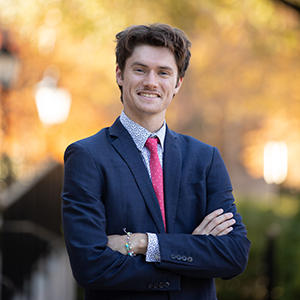 Other Awards: Outstanding Senior from the National Alumni Association, Silverstein Scholar, Blount Graduate
Other Awards: Outstanding Senior from the National Alumni Association, Silverstein Scholar, Blount Graduate
Hometown: Fort Lauderdale, Florida
Favorite Experience: My favorite experience at The University of Alabama has been the creation and success of the Crimson Historical Review, UA’s first (and only) peer-edited history journal. The CHR began with a few energetic students, me included, all eager to provide rich research opportunities for fellow undergraduates. With this small staff, the journal produced a quality, albeit limited, initial issue; since, the Review has blossomed, becoming one of the nation’s most prestigious student-run publications. Last year, for instance, the CHR received over one hundred submissions from a diverse body of undergraduates, both geographically—from Harvard, Brown, and British Columbia (Canada), to name a few—and methodologically—presenting intellectual, intersectional, and material histories. Far more important than the reputation of the Review, however, was (and still is) the formation of a community around it. This community, composed of dozens of UA students passionate about history, writing, and scholarly publication, is sharp, supportive, and constantly self-improving. In fact, one of my foremost privileges as co-Editor-in-Chief is witnessing review board members dissect the substance and argumentation of an article, or copy editors correct and perfect an author’s prose; I learn so much from them all and their varied interests, approaches, and expertise. And I am confident, through my continued interaction with Review staff, that the journal will be in capable hands when I leave campus.
Favorite Class: I remember being asked this question last year; and while I have truly enjoyed my senior curriculum, I admit my answer has not changed much since. My favorite class is Dr. Lucy Kaufman’s HY 383, ‘Living in Tudor England.’ The course transformed my approach to history, reminding me of the subject’s central focus: people—their needs, wants, struggles, and triumphs. To this end, Dr. Kaufman developed a reading list that prioritized previously untold stories: I heard the voices of toiling yeomen, common artisans, abandoned wives, and doting mothers. (We even perused the medical file of a young man from Coventry ‘sick in his love’—heartbroken in the sixteenth century!) In other words, the class introduced me to people different in their chronology, circumstance, and context and insisted that I relate to them; this will prove an invaluable skill for not only historical study, but general life, too. Also, the course was set in Oxford, an ideal location. In the city’s streets, buildings, churches, and libraries, I was able to physically engage with the material I was learning, which was a truly humbling experience. I would be remiss, however, to forget to mention a few others: Dr. Margaret Peacock’s HY 394, ‘The Historian’s Craft’—in my opinion, the best introduction to the method and practice of history in the country—, Dr. Nathan Loewen’s REL 231, ‘Religious Existentialism’—a ‘who’s-who’ of important philosophical minds—, as well as Dr. Lawrence Cappello’s HY 309, ‘Great Cases in U.S. Legal History,’ Dr. Janek Wasserman’s HY 407, ‘History of Capitalism,’ and Dr. Andrew Dewar’s BUI 301, ‘Mash-Up: Intermedia Intersections in the Arts.’
Future Plans: Last semester, I was fortunate to receive a Marshall scholarship, which is awarded to fifty young Americans to pursue any degree in the United Kingdom. This September, I will undertake my first year of fully-funded study at Durham University; there, I will read for an M.A. in medieval and early modern studies, writing a thesis related to the formation of the English state, the development of laws concerning suicide, murder, and suspicious death, and their connection. Later, in my second term as a Marshall scholar, I will seek an M.S. in digital humanities, the aim of which is to make my research—both past and future—more publicly-accessible. These degrees, I hope, will prepare me for a final PhD in English history or, perhaps, a JD specializing in comparative law. Past that, I am interested in a few careers: as a university professor, public interest lawyer (particularly concerning prison reform and abolition), or senior program officer at the National Endowment for the Humanities, where I previously interned.